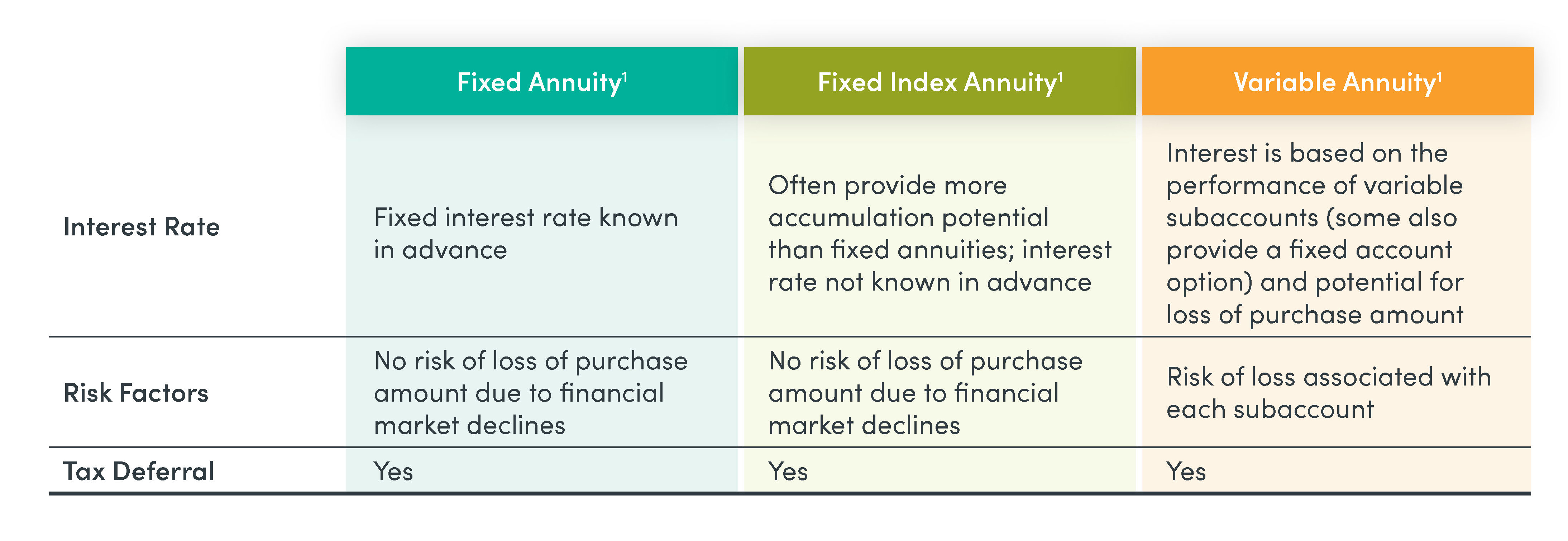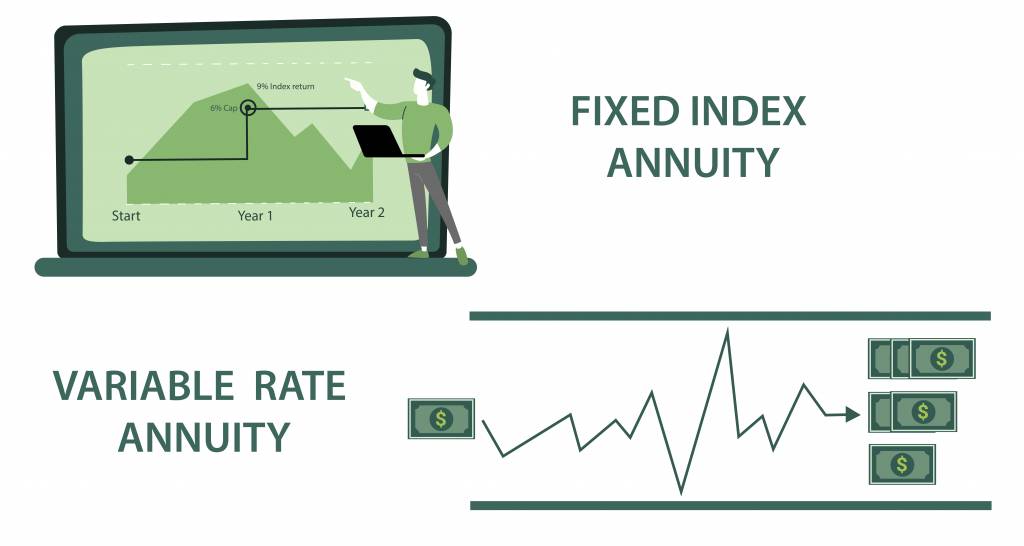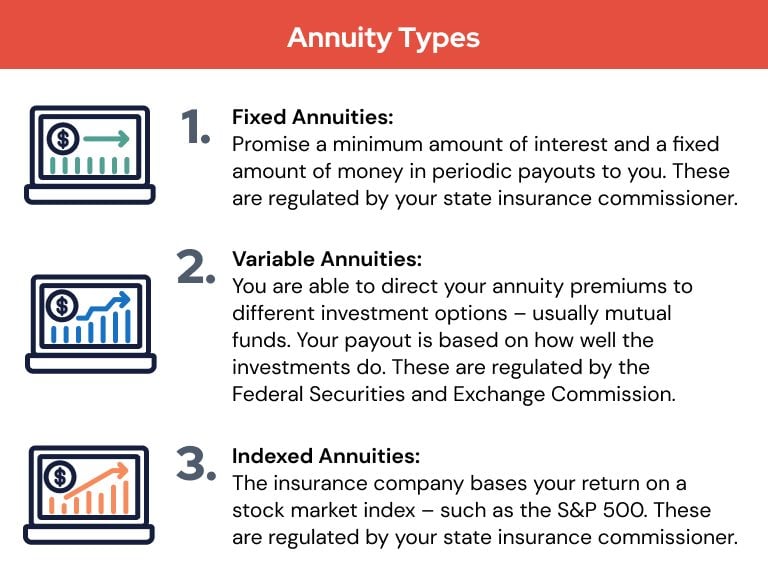All Categories
Featured
Table of Contents
Just as with a fixed annuity, the proprietor of a variable annuity pays an insurer a round figure or collection of repayments for the guarantee of a collection of future settlements in return. As pointed out above, while a dealt with annuity expands at an ensured, consistent rate, a variable annuity expands at a variable rate that depends upon the efficiency of the underlying financial investments, called sub-accounts.

Throughout the build-up phase, properties invested in variable annuity sub-accounts expand on a tax-deferred basis and are exhausted just when the contract proprietor withdraws those revenues from the account. After the buildup phase comes the earnings phase. Gradually, variable annuity properties should in theory raise in value till the agreement proprietor decides he or she want to begin withdrawing cash from the account.
The most considerable issue that variable annuities normally present is high expense. Variable annuities have numerous layers of fees and costs that can, in accumulation, produce a drag of up to 3-4% of the contract's value each year.
Breaking Down Your Investment Choices A Closer Look at Choosing Between Fixed Annuity And Variable Annuity What Is Annuities Fixed Vs Variable? Pros and Cons of Various Financial Options Why Variable Annuity Vs Fixed Annuity Is Worth Considering Tax Benefits Of Fixed Vs Variable Annuities: Simplified Key Differences Between Tax Benefits Of Fixed Vs Variable Annuities Understanding the Key Features of Fixed Vs Variable Annuity Pros Cons Who Should Consider Annuity Fixed Vs Variable? Tips for Choosing Fixed Annuity Vs Equity-linked Variable Annuity FAQs About Planning Your Financial Future Common Mistakes to Avoid When Choosing a Financial Strategy Financial Planning Simplified: Understanding Fixed Income Annuity Vs Variable Growth Annuity A Beginner’s Guide to Smart Investment Decisions A Closer Look at How to Build a Retirement Plan
M&E cost costs are calculated as a percent of the agreement value Annuity issuers pass on recordkeeping and other administrative costs to the contract proprietor. This can be in the type of a level yearly fee or a percent of the agreement worth. Management charges might be consisted of as part of the M&E threat charge or may be assessed independently.
These fees can range from 0.1% for passive funds to 1.5% or more for proactively handled funds. Annuity contracts can be tailored in a variety of ways to offer the certain demands of the agreement owner. Some usual variable annuity motorcyclists include guaranteed minimal build-up benefit (GMAB), assured minimum withdrawal advantage (GMWB), and ensured minimal income advantage (GMIB).

Variable annuity payments give no such tax deduction. Variable annuities have a tendency to be extremely inefficient automobiles for passing riches to the next generation since they do not appreciate a cost-basis adjustment when the original contract proprietor dies. When the owner of a taxable investment account dies, the cost bases of the financial investments held in the account are readjusted to mirror the market prices of those financial investments at the time of the proprietor's fatality.
Understanding Annuity Fixed Vs Variable Everything You Need to Know About Fixed Annuity Vs Variable Annuity What Is Fixed Index Annuity Vs Variable Annuities? Features of Smart Investment Choices Why Variable Vs Fixed Annuity Is Worth Considering How to Compare Different Investment Plans: A Complete Overview Key Differences Between Variable Vs Fixed Annuities Understanding the Risks of Fixed Vs Variable Annuity Pros Cons Who Should Consider Fixed Index Annuity Vs Variable Annuity? Tips for Choosing the Best Investment Strategy FAQs About Fixed Annuity Or Variable Annuity Common Mistakes to Avoid When Choosing Pros And Cons Of Fixed Annuity And Variable Annuity Financial Planning Simplified: Understanding Your Options A Beginner’s Guide to Variable Vs Fixed Annuity A Closer Look at How to Build a Retirement Plan
Such is not the case with variable annuities. Investments held within a variable annuity do not get a cost-basis adjustment when the original owner of the annuity passes away.
One substantial concern associated with variable annuities is the capacity for problems of rate of interest that might feed on the part of annuity salesmen. Unlike a financial consultant, that has a fiduciary obligation to make investment decisions that profit the client, an insurance broker has no such fiduciary commitment. Annuity sales are extremely rewarding for the insurance policy professionals who offer them due to high ahead of time sales commissions.

Numerous variable annuity agreements consist of language which places a cap on the percent of gain that can be experienced by particular sub-accounts. These caps stop the annuity owner from completely getting involved in a section of gains that can otherwise be appreciated in years in which markets produce substantial returns. From an outsider's perspective, it would certainly appear that financiers are trading a cap on investment returns for the previously mentioned ensured floor on financial investment returns.
As kept in mind above, give up fees can drastically limit an annuity owner's capability to relocate properties out of an annuity in the very early years of the agreement. Further, while the majority of variable annuities permit contract owners to take out a specified quantity throughout the build-up phase, withdrawals yet amount usually lead to a company-imposed charge.
Withdrawals made from a fixed rates of interest investment choice might also experience a "market worth change" or MVA. An MVA adjusts the value of the withdrawal to mirror any changes in rates of interest from the moment that the money was purchased the fixed-rate choice to the moment that it was taken out.

Frequently, also the salespeople who market them do not completely recognize just how they function, and so salesmen occasionally take advantage of a buyer's emotions to offer variable annuities rather than the advantages and viability of the products themselves. Our company believe that investors must completely understand what they possess and just how much they are paying to have it.
Breaking Down Your Investment Choices A Comprehensive Guide to Choosing Between Fixed Annuity And Variable Annuity What Is Variable Annuity Vs Fixed Annuity? Features of Fixed Vs Variable Annuity Pros And Cons Why Choosing the Right Financial Strategy Is Worth Considering How to Compare Different Investment Plans: How It Works Key Differences Between Fixed Vs Variable Annuity Understanding the Rewards of Long-Term Investments Who Should Consider Choosing Between Fixed Annuity And Variable Annuity? Tips for Choosing the Best Investment Strategy FAQs About Fixed Vs Variable Annuity Common Mistakes to Avoid When Planning Your Retirement Financial Planning Simplified: Understanding Variable Annuity Vs Fixed Indexed Annuity A Beginner’s Guide to Deferred Annuity Vs Variable Annuity A Closer Look at How to Build a Retirement Plan
The same can not be claimed for variable annuity properties held in fixed-rate financial investments. These possessions legitimately come from the insurance policy firm and would for that reason go to danger if the firm were to stop working. Any kind of warranties that the insurance coverage company has actually concurred to give, such as an assured minimal revenue advantage, would certainly be in inquiry in the event of a business failing.
Possible buyers of variable annuities need to comprehend and think about the monetary condition of the issuing insurance coverage company before getting in right into an annuity agreement. While the advantages and disadvantages of various types of annuities can be questioned, the genuine concern surrounding annuities is that of viability.
As the stating goes: "Purchaser beware!" This short article is prepared by Pekin Hardy Strauss, Inc. Best annuities for long-term planning. ("Pekin Hardy," dba Pekin Hardy Strauss Wealth Management) for educational purposes only and is not meant as an offer or solicitation for organization. The information and information in this short article does not make up legal, tax, bookkeeping, financial investment, or other expert recommendations
Table of Contents
Latest Posts
Decoding Choosing Between Fixed Annuity And Variable Annuity A Closer Look at How Retirement Planning Works Defining Fixed Vs Variable Annuity Pros Cons Features of Variable Annuities Vs Fixed Annuiti
Exploring the Basics of Retirement Options A Closer Look at How Retirement Planning Works Defining Fixed Interest Annuity Vs Variable Investment Annuity Advantages and Disadvantages of Pros And Cons O
Breaking Down Variable Annuity Vs Fixed Annuity Everything You Need to Know About Financial Strategies Defining Fixed Income Annuity Vs Variable Growth Annuity Advantages and Disadvantages of Differen
More
Latest Posts